Conditionnel Passé (Conditional Past) Tense Conjugation of the French Verb boycotter
Introduction to the verb boycotter
The English translation of the French verb boycotter is “to boycott.” It is pronounced boi-kot-ey (with the final “er” being silent).
The word boycotter originated from the English name Captain Charles Cunningham Boycott, who was an English land agent in Ireland. The term “boycott” was first coined in 1880 when Boycott’s tenants refused to work for him or trade with him in protest against his unfair treatment of them. The word quickly entered the French language as “boycotter” and became a commonly used term for boycotting or refusing to participate in something as a form of protest.
In everyday French, the Conditionnel Passé tense is used to express a hypothetical or unreal action in the past. It is formed by using the auxiliary verb “avoir” or “être” in the Conditionnel Présent tense followed by the past participle of the main verb (boycotté).
Here are three simple examples of the usage of boycotter in the Conditionnel Passé tense:
-
Si j’avais su que l’entreprise polluait l’environnement, je l’aurais boycottée. (If I had known that the company was polluting the environment, I would have boycotted it.)
-
Nous aurions boycotté ce film s’il avait été réalisé par un réalisateur controversé. (We would have boycotted this film if it had been directed by a controversial director.)
-
Si vous aviez écouté nos revendications, nous n’aurions pas boycotté votre événement. (If you had listened to our demands, we would not have boycotted your event.)
English translations:
-
If I had known that the company was polluting the environment, I would have boycotted it.
-
We would have boycotted this film if it had been directed by a controversial director.
-
If you had listened to our demands, we would not have boycotted your event.
Table of the Conditionnel Passé (Conditional Past) Tense Conjugation of boycotter
| Pronoun | Conjugation | Example Usage | English Translation |
|---|---|---|---|
| je | aurais boycotté | Si j’avais su, j’aurais boycotté. | I would have boycotted. |
| tu | aurais boycotté | Tu aurais boycotté le magasin. | You would have boycotted the store. |
| il | aurait boycotté | Il aurait boycotté l’évènement. | He would have boycotted the event. |
| elle | aurait boycotté | Elle aurait boycotté la compagnie. | She would have boycotted the company. |
| on | aurait boycotté | On aurait boycotté les produits. | One would have boycotted the products. |
| nous | aurions boycotté | Nous aurions boycotté la manifestation. | We would have boycotted the protest. |
| vous | auriez boycotté | Vous auriez boycotté le concert. | You would have boycotted the concert. |
| ils | auraient boycotté | Ils auraient boycotté le vote. | They would have boycotted the vote. |
| elles | auraient boycotté | Elles auraient boycotté le produit. | They (female) would have boycotted the product. |
Other Conjugations for Boycotter.
Le Present (Present Tense) Conjugation of the French Verb boycotter
Imparfait (Imperfect) Tense Conjugation of the French Verb boycotter
Passé Simple (Simple Past) Tense Conjugation of the French Verb boycotter
Passé Composé (Present Perfect) Tense Conjugation of the French Verb boycotter
Futur Simple (Simple Future) Tense Conjugation of the French Verb boycotter
Futur Proche (Near Future) Tense Conjugation of the French Verb boycotter
Plus-que-parfait (Pluperfect) Tense Conjugation of the French Verb boycotter
Passé Antérieur (Past Anterior) Tense Conjugation of the French Verb boycotter
Futur Antérieur (Future Anterior) Tense Conjugation of the French Verb boycotter
Subjonctif Présent (Subjunctive Present) Tense Conjugation of the French Verb boycotter
Subjonctif Passé (Subjunctive Past) Tense Conjugation of the French Verb boycotter
Subjonctif Imparfait (Subjunctive Imperfect) Tense Conjugation of the French Verb boycotter
Subjonctif Plus-que-parfait (Subjunctive Pluperfect) Tense Conjugation of the French Verb boycotter
Conditionnel Présent (Conditional Present) Tense Conjugation of the French Verb boycotter
Conditionnel Passé (Conditional Past) Tense Conjugation of the French Verb boycotter (this article)
L’impératif Présent (Imperative Present) Tense Conjugation of the French Verb boycotter
L’infinitif Présent (Infinitive Present) Tense Conjugation of the French Verb boycotter
Struggling with French verbs or the language in general? Why not use our free French Grammar Checker – no registration required!
Get a FREE Download Study Sheet of this Conjugation 🔥
Simply right click the image below, click “save image” and get your free reference for the boycotter Conditionnel Passé tense conjugation!

Boycotter – About the French Conditionnel Passé (Conditional Past) Tense
Formation
Common Everyday Usage Patterns
Expressing Unreal Past Scenarios
Polite Requests or Suggestions
Expressing Doubt or Uncertainty
Interactions with Other Tenses
Conditional Present
Indicative Past Tenses
Conditional Future
Summary
Want More?
I hope you enjoyed this article on the verb boycotter. Still in a learning mood? Check out another TOTALLY random French verb conjugation!


